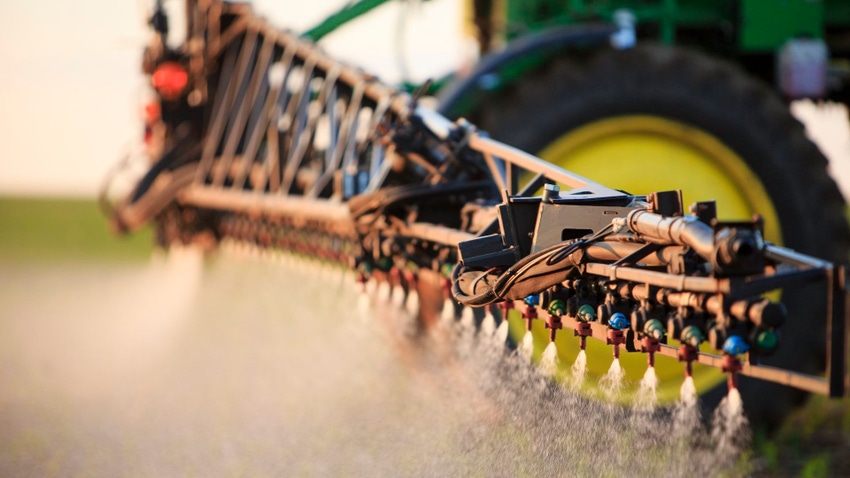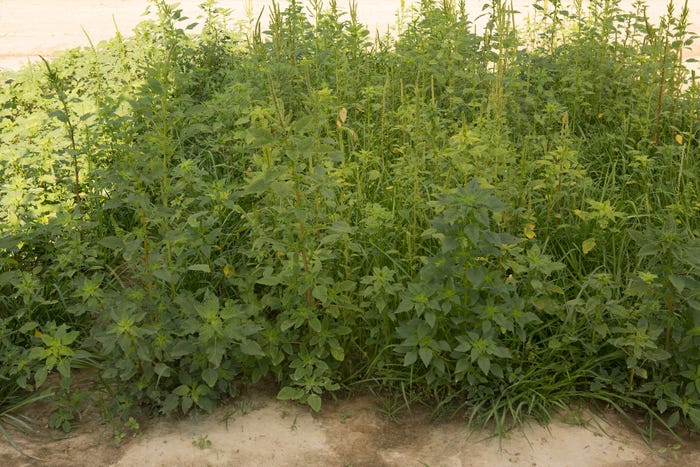April 15, 2024

How much can a weedy field impact final yield? More than you may think.
Experts say uncontrolled Palmer amaranth can reduce soybean yield by nearly 80%.1 Cotton yield losses have been documented as high as 60%, with a 6% loss for every pigweed per 6.1 meters during the three- to eight-leaf stage.2
For soybean and cotton producers across the South, the takeaway is clear: Protect yield early with a zero-tolerance stance against this troublesome weed.
Palmer amaranth has an especially detrimental impact on yield because of its quick growth — up to 2.5 inches per day — with female pigweed producing up to 600,000 seeds per plant. Compounding the issue, many Palmer amaranth weeds are resistant to glyphosate throughout the South.
Without excellent management, pigweeds can go from “not my problem” to out of control in one season.
Producers planting Enlist E3® soybeans or Enlist® cotton have an advantage in controlling Palmer amaranth with tolerance to three postemergence herbicides — 2,4-D choline, glyphosate and glufosinate. With the Enlist® weed control system, farmers can use multiple sites of action in one pass.

Experts say glyphosate-resistant weeds such as Palmer amaranth can lower soybean and cotton yields significantly, reducing profit potential. But producers planting Enlist E3® soybeans and Enlist® cotton have an advantage with postemergence tank-mix applications of Enlist One® and Liberty® herbicides. Photo submitted by Corteva Agriscience.
To maximize control of Palmer amaranth with the Enlist® system, Enlist® field specialists recommend a postemergence tank mix of Enlist One® and Liberty® herbicides. Brett Gordon, Enlist field specialist for the Midsouth, says this tank mix is the best option to keep fields clean and protect yield against aggressive pigweed.
“A tank mix of Enlist One and Liberty herbicides is the most effective and powerful postemergence treatment to control weeds like Palmer amaranth,” Gordon says. “In 2020 trials, we saw this tank mix dominate Palmer amaranth with 100% control of Palmer pigweed 28 days after application.”
Get the most out of the best
Gordon emphasizes postemergence applications of Enlist One + Liberty herbicides must be part of an integrated weed management program. Producers should start the season clean with a burndown or tillage and use preemergence residual herbicides to manage weeds between planting and stand establishment.
Postemergence applications of Enlist One and Liberty herbicides should be made when pigweeds are 3 inches tall or less. Producers can make two applications of this tank mix per season with no calendar cutoff dates — through R1 on Enlist E3® soybeans and early bloom on Enlist cotton.
“A tank mix of Enlist One and Liberty herbicides gives Southern growers the control of postemergence Palmer amaranth they need with the flexibility to make applications according to what’s going on in their fields, not based on imposed calendar dates,” Gordon says. “Plus, they can have confidence in their applications because of the inherent near-zero volatility of Enlist One herbicide. Adding Liberty herbicide in the tank with Enlist One herbicide does not increase the potential for volatility.”
Gordon reminds growers that Enlist® herbicides are the only 2,4-D herbicides authorized for use with Enlist E3® soybeans and Enlist cotton.
When making an application of Enlist One® and Liberty® herbicides, Gordon recommends the following:
Rates: 32 oz./A of Enlist One herbicide and 32 oz./A of Liberty herbicide.
Water volume: Recommended 20 GPA with a minimum of 15 GPA.
Adjuvants: AMS at 1.5 to 3 lb./A from qualified AMS-containing products (see EnlistTankMix.com).
Nozzle: Use a qualified nozzle and corresponding pressure combination to optimize coverage.
Weather: Avoid low humidity, cloudy conditions, temperature inversions and wind speeds greater than 10 mph.
To learn more about how the Enlist weed control system can help you control Palmer amaranth, visit Enlist.com. Find the most current list of qualified tank-mix products for Enlist One herbicide at EnlistTankMix.com.
1U.S. Department of Agriculture, National Resource Conservation Service. 2017. Palmer Amaranth. https://www.fsa.usda.gov/Assets/USDA-FSA-Public/usdafiles/FactSheets/archived-fact-sheets/palmer_amaranth_nrcs_national_factsheet.pdf
2MacRae, A. W., et. al. 2013. Cotton Yield Loss Potential in Response to Length of Palmer Amaranth (Amaranthus palmeri) Interference. https://www.cotton.org/journal/2013-17/3/upload/jcs17-227.pdf
® Enlist, Enlist Duo, Enlist E3 and Enlist One are trademarks of Corteva Agriscience and its affiliated companies. The transgenic soybean event in Enlist E3® soybeans were jointly developed by Corteva Agriscience and M.S. Technologies L.L.C. Enlist Duo® and Enlist One® are not registered for sale or use in all states or counties. Contact your state pesticide regulatory agency to determine if a product is registered for sale or use in your area. Enlist Duo and Enlist One herbicides are the only 2,4-D products authorized for use with Enlist® crops. Consult Enlist herbicide labels for weed species controlled. ®Liberty is a registered trademark of BASF. Always read and follow label directions. ©2024 Corteva. 20397 BR (03/24) CAAG4NLST067
You May Also Like





